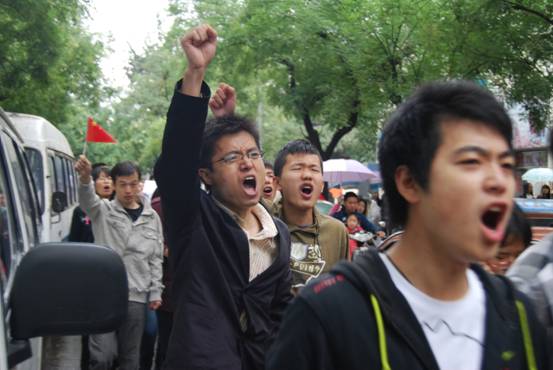Beijing demo demands release of fishing captain
Braving rain and chilly temperatures, a small but angry crowd of demonstrators gathered outside the Japanese embassy in Beijing on Saturday morning. The ostensible reason was to mark the 79th anniversary of the Mukden incident of September 18, 1931 which sparked the second Sino-Japanese war. But the hundred-or-so mainly youthful protesters were clearly animated by recent events around the uninhabited Diaoyu islands which are claimed by both China and Japan. (Watch video)
 |
|
On September 18 around 100 protestors marched in Beijing to demand Japan release Chinese fishing boat captain Zhan Qixiong. [Photo China.org.cn] |
Asked why he was protesting, a young man said, "We want them to release our captain and give back the islands. We organized this protest ourselves."
Police moved the protesters away from the Japanese embassy and shepherded them through the broad leafy streets around Ritan Park in Beijing’s embassy district. The marchers, carrying home-made, hand-written placards and national flags, were outnumbered by police and almost matched in numbers by reporters and camera crews from the international press.
Expectations of a large turnout had been fueled by reports in the Japanese press that police leave had been canceled in Beijing. In 2005 thousands of people turned out in China and other East Asian countries to protest revisions to Japanese history textbooks. But the marchers in Beijing today were numbered in dozens.
The marchers sang an old revolutionary anthem "Unity is Strength," and from time to time broke into the national anthem, which was itself composed during the war against Japan. The horrors of the Japanese occupation are still very much alive in the minds of many Chinese people and popular feeling continues to complicate relations between the two countries.
The protest passed off peacefully, although there was a moment of excitement when police arrested one person in Guanghua Road. Calm was restored when police said the person they had detained was a pickpocket.
Go to Forum >>0 Comments
 Add your comments...
Add your comments...
- User Name Required
- Your Comment
- Racist, abusive and off-topic comments may be removed by the moderator.
 0
0 






